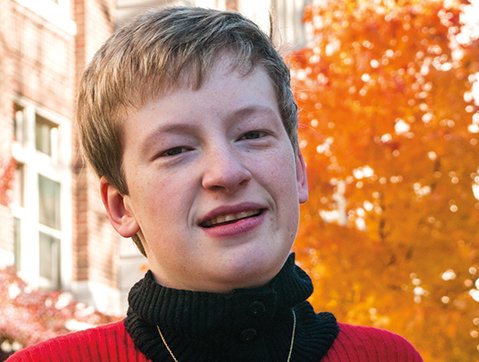Deandra Bardell: What drives your curiosity?

CSE mathematics student succeeds despite physical challenges
April 7, 2017
Many science and engineering students are fortunate enough to get their homework assignments done in a few hours, but things are a bit more complicated for College of Science and Engineering student Deandra Bardell. She was born with a fractured skull and suffers from cerebral palsy, a neurological disorder that weakens motor function, resulting in impaired body movement and coordination. Because of her muscular limitations, her homework assignments take her much longer than the average student—she has to type out her work one key at a time on her computer.
The junior from Fridley, Minn., who is majoring in mathematics and minoring in computer science, has been interested in math for as long as she can remember. From sorting toys by color to doing puzzles with her eyes, Bardell expressed her love for problem solving at a very young age.
In high school, Bardell taught herself how to type math problems into Microsoft Word, which proved faster and more efficient than telling other people to write out the solutions for her. After being accepted to the University of Minnesota, Bardell decided she needed something more powerful. She adapted her own equipment for her computer and started using LaTeX, an advanced application designed for processing scientific documents.
“All my life I’ve had people, even experts, tell me and my family ‘no’ and that I’d never be able to do anything.” said Deanna Bardell.
Proving herself
Despite being so bright, one of her biggest challenges is convincing others of her intelligence. She constantly feels the need to prove that she belongs at such a prestigious school, especially among her fellow students. “Being at a large university, my peers are always changing,” Bardell explains. “Class sizes are big. With the constant changes, it’s hard to be a part of a group long enough for them to see past my disability and get to know me.”
Getting around the University’s sizable campus is also a significant challenge for Bardell, who uses a power wheelchair. However, her family makes sure she gets to classes every day on time. “They’ve been with me every step of the way,” Bardell said. “They have and continue to sacrifice so much for me. There’s no way I can ever pay them back. I wish I could.”
Even though she is limited by the time constraints of classwork and transportation, Bardell takes 12-14 credits per semester. She plans to graduate in Spring 2018, and she is not sure exactly what she wants to do after graduation. Finance, data analysis, and software development are merely a few of her interests, and she also expresses intrigue in the fields of healthcare and innovative technology.
Making her dream a reality
As Bardell admits, even though it may take her five years to graduate because of her needs, she never loses sight of her goal and dream of joining the work world. She is thankful for the Isaac Benjamin Segal Scholarship that helps her financially, and she is grateful to her scholarship donors for giving her incentives to learn and grow.
“It’s motivation and inspiration to keep working hard,” Bardell said. “I understand the late Isaac Benjamin Segal absolutely loved math and published work as an undergrad. He was also passionate about giving everyone opportunities, regardless of circumstance. In some small way I hope to help his spirit live on,” she added.
“All my life I’ve had people, even experts, tell me and my family ‘no’ and that I’d never be able to do anything,” Bardell said. “They see my disability instead of my abilities. I think my biggest accomplishment is refusing to listen or accept what people say my life will be. I persevere and find ways to accomplish my goals. I keep moving forward. I choose to keep moving forward.”
Story by Olivia Hultgren
If you'd like to support University of Minnesota College of Science and Engineering students, visit our CSE Giving website.
